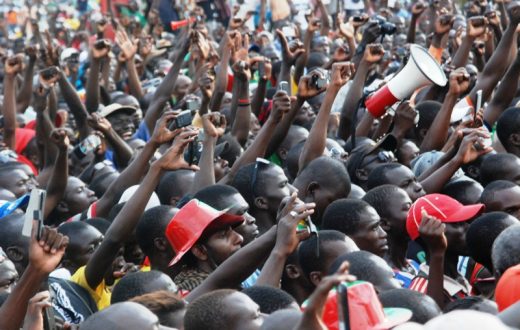Nigeria is now the largest economy in Africa, and global multinationals are queuing up to tap into its potential. Yet there are still major hurdles for the country to overcome before it can properly silence its critics.
The clouds burst overhead as an army of hawkers wades knee-deep through the rising floodwaters on Akin Adesola Street. In their hopeful, outstretched, hands are Chinese-manufactured mobile phones, plastic sachets of lurid green detergent, and towering bales of pirated Nollywood DVDs.
We are encircled by water: west toward the Benin border, north to the boundary of Lagos state, east toward the cradle of economic growth – the oil delta. This is Lagos in the midst of what feels like a biblical flood. But the “Area Boys” – young gangs who control street trade – don’t seem to be skipping a beat. Here on Victoria Island, in the heart of Africa’s most manic urban sprawl, it is business as usual. Rising floodwaters amount to one thing: a captive audience of stranded yellow kombi taxis and a grand opportunity.
Any reflection on the startling pace of change on the world’s second-largest continent should arguably begin here on the streets of West Africa’s unofficial capital, which remains a mirror to Nigeria’s unbridled economic progress. Here, in this city of around 20 million, the startling disjuncture between the wealthy and the impoverished can be seen in full Technicolor.
Yet the fact is that Nigeria, recently announced as Africa’s largest economy, is no longer a one-dimensional story of oil and corruption. The headlines on newsstands increasingly offer a broader picture. For example, SMEs are growing, and chemical and pharmaceutical products activities in the manufacturing sector grew by 38.5% in the second quarter of this year. Today, Nigeria stands as the world’s 24th-largest economy, slotting in slightly behind Sweden but ahead of energy-rich Norway. There is optimism in the air – even if cynics say it is polluted.

NIGERIA FACTS
The Federal Republic of Nigeria, located in Western Africa on the Gulf of Guinea, is the most populous country in Africa with a rich cultural heritage and diverse ethnic background. Half of its 170 million population is Muslim, while Christianity is practiced by 48%. A former British colony, Nigeria gained independence in 1960. After years of civil war and military rule, it has been on the path to democratization since 1999, with Goodluck Jonathan elected President in 2011. This year Nigeria overtook South Africa as the largest economy in Africa. While oil reserves still play a major role, Nigeria’s financial and telecommunications sectors are growing fast and it has a promising pipeline of infrastructure projects.
The reason for their cynicism is because the nation’s much heralded growth status has polarized economists, NGOs, and businessmen alike. With its population of 170 million people and economic power, Nigeria has the potential to lead its energetic and ambitious people into a new epoch. But, as the World Bank recently reiterated, a significant portion of its vast population lives on less than $1.25 a day. Meanwhile, youth unemployment is close to 80%, and chronic power shortages continue to stifle business and put a brake on economic growth. Plus there is the threat from Boko Haram, a vicious Islamist insurgency in the country’s remote and sparsely populated north-east. Despite a ceasefire announced in October, the group is, at the time of writing, still holding hostage more than 200 girls seized in this part of the country – a region which, unsurprisingly, has become increasingly marginalized from a trade and investment perspective.

INVESTMENT FLOWS IN
At the epicentre of this 21st-century story of extremes of hope and doubt is teeming Lagos, a magnet for the optimistic poor. Every year about 600,000 locals join the city’s informal economy. The UN estimates that within a few years Lagos could edge out Karachi to become the world’s third-largest city, after Tokyo and Mumbai. It is for this reason that Nigeria’s economic future looks increasingly urban.
If Lagos became independent tomorrow, its GDP would be similar in size to Angola. But such breakneck pace also brings with it a propensity for whiplash. The city is also one of the most congested urban sprawls on the planet, with a rudimentary mass transit system and chronic infrastructure problems.
Indeed, the city’s Governor, Babatunde Fashola, recently put the estimated amount required for infrastructure development in Lagos in the next 10 years at $50 billion. No wonder Lagos state has used a Public- Private Partnership (PPP) strategy to solve its vast infrastructure deficit. At the beginning of 2014, the Lagos State Government revealed that 83 roads had been completed in 2013 – as had Nigeria’s first cable-stayed bridge, the Lekki-Ikoyi Link Bridge (although this was publicly, not PPP, funded). The State Government also recently revealed how N160 billion ($981 million) it borrowed from the World Bank has been used to fund its Light Rail project.
Nigeria has also privatized the infrastructure and assets of Parastatal Power Holding Company of Nigeria, splitting the company up in regional distribution and placing the national power grid on a management contract. This is crucial to solve Nigeria’s notoriously erratic power supply. Although it will likely take years for the power supply to improve, it is hoped that private investors are placed to access the funding and technical expertise required to make it happen.
Oliver Facey, Vice President of Operations at DHL Express Sub–Saharan Africa, sees this infrastructure scale-up and improved regional trade, from both an SME and multinational perspective, as intertwined. “As multinationals turn to Africa, and as smaller African enterprises look to trade cross-border, regions like West Africa need increased capacity to cope with the rising demand for transportation of goods,” he says.
This demand for goods from a growing middle class is a turnaround because, to date, Nigeria’s economic growth has been a narrative shaped by oil and gas. Although energy resources only account for 14% of its GDP, they are still responsible for 75% of Nigeria’s federal revenue and 90% of exports. But the recent rewriting of Nigeria’s GDP took into account thirteen previously uncounted industries which included telecommunications, online sales, film production, and music, each offering promising signs for the future. In short, it’s increasingly all about “human energy”.
And international companies want to tap into that energy. General Electric recently became one of the global manufacturers to take advantage of this new narrative, with a $1 billion investment over five years in a service and manufacturing facility in Calabar, Cross River State. On a bigger scale, the $9 billion investment of Dangote Group in petroleum refining and petrochemical and fertilizer plant in the Olokola Free Trade Zone is set to transform the area. Nigeria is also making the great leap towards its own car industry. In the last few months Nissan began manufacturing family saloons and SUVs at an old Lagos Volkswagen assembly – foreign cars with a “Made in Nigeria” stamp.
Certainly, foreign investment is increasing. According to a June 2014 report from the United Nations Conference on Trade and Development (UNCTAD), Nigeria’s foreign direct investment (FDI) inflow stood at $5.6 billion in 2013. Yet a May 2014 report from Ernst and Young forecasts that FDI inflows to Nigeria will average about $23 billion annually over the next five years and create around 95,000 jobs.

PEOPLE POWER
The bottom line, digging beneath the statistics, is that there is a positive story here and all to play for. To be a dominant world economy, like China or America, two fundamental things are required: a large population and strong productivity. Nigeria is making bullish inroads into both. Simple demography is probably the most fundamental factor. At 180 million, the current population is the world’s seventh-highest. By 2050, this is projected to be 400 million, setting Nigeria on course to replace the United States as the world’s third most populous country.
This population windfall is part of a broader developing world trend whereby 1.2 billion mostly emerging-economy youth are forecast to move out of subsistence poverty by 2020. For this new generation of local consumers in Nigeria, household discretionary spending will exceed $5,000 for the first time. What this means in the present is Nigeria, as a burgeoning consumer market, is simply too large to ignore.
MANAGING RISK
Doing business in Nigeria can present certain risks. The DHL Resilience360 solution is a unique and highly customizable supply chain risk management resource that is designed to protect sales, maintain service levels, reduce emergency costs, and enable fast post-disruption recovery. A risk assessment process maps and visualizes the customer’s entire supply chain and analyzes the network to identify exposures and vulnerability as well as options for immediate recovery. The Incident Monitoring platform allows real-time tracking of incidents that are capable of disrupting the supply chain – including lanes, nodes, plants, suppliers, and shipments – assesses their potential impact on the end-to-end supply chain, and creates notification alerts with site feedback loops.
E-COMMERCE EXPLOSION
According to DHL Express Nigeria’s Managing Director, Randy Buday, the growth in the consumer market is a barometer of profound change. “An untold narrative I see in Nigeria is the explosion in the world of e-commerce,” he says. “Today Nigerians can get the products they need online. For the last five years, we have seen huge changes in information and communication technology, and this is encouraging not only growth areas like e-commerce but also startups. I have worked in Africa for 30 years and seen great change. Today Nigeria is an entrepreneurial environment – a business frontier, where e-commerce can thrive and where we are seeing better governance. It is, without question, the most exciting, promising, and hopeful time in the nation’s post-independence history.”
Yet there are challenges on this new economic frontier. Many critics have pointed at Nigeria’s banking sector for not doing enough to help foster startups. According to figures from the National Bureau of Statistics and the Small and Medium Enterprises Development Agency of Nigeria, the country boasts over 17 million SMEs. Yet at least 50% operate informally and are handicapped by a lack of access to cashflow.
One major positive in the sector is the efforts by SAP Africa, in partnership with Ernst and Young – both committed to transforming Nigeria’s banking sector. SAP’s Head of Financial Services for Africa, Darrel Orsmond, believes making the banking sector more internationally compliant will be key to growth. He says, “Countries all over Africa – including Nigeria, the largest economy – are making every effort to increase their levels of regulatory compliance to keep up with legislative and economic requirements for analyzing financial data, including threats and risks. By identifying and eliminating risks in advance through the use of real-time reporting, banks can satisfy the needs and demands of stakeholders thereby reducing risk and increasing regulatory compliance.”
Entering the Nigerian market is still an unknown quantity for many. Heather Frankle, Managing Director of DHL Global Forwarding in Nigeria, says there has been an influx of enquiries about how to do business in the country not only from customers in the West, but also from within Africa. “There are a lot of African businesses coming into Nigeria now and this is incredibly positive,” she says. “They tell us they want information about entering Nigeria and, most importantly, becoming legally compliant.”
Oliver Facey believes that lateral thinking has always been key to making it in Nigeria. “Because of the crippling congestion in Lagos, a courier van can take up to three hours to collect or deliver customer consignments between the airport and the city center” he says. “Our solution was to use Lagos abundant water, so we added a DHL boat to our fleet to ferry our parcels and documents from Victoria Island to the mainland, which connects to our aircraft at our Gateway and Hub at Murtala Mohammed International Airport (MMIA). It’s a great solution to an enduring problem.”
Success on the ground also takes lateral thinking. To this end Lagos offers a laboratory for Africa’s future. For both foreign investors and local people, adaptability is key to not just surviving but thriving – a can-do mentality that emerges from the streets. Unless you have struggled across Lagos at rush hour it’s impossible to understand the scale, energy, and challenges brought by the new African epoch of prosperity. The markets never close. Informal transactions make up at least 60% of all economic activity in Africa’s largest city; where else can you purchase matches, cigarettes, and a fire extinguisher from the same vendor? What looks like anarchic activity in Lagos is actually governed by a set of informal, but ironclad rules.
And in Lagos, one thing is abundantly clear: there is little evidence of idleness sinking into despair – even on the street. It feels like a city that wants to break the mould because its people understand that to survive you first need to become a striver.







